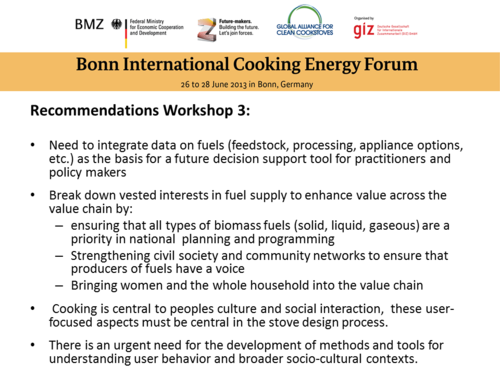Difference between revisions of "Emerging Opportunities in Cooking Fuels & in Changing Cooking Habits - Workshop 3 Recommendations Bonn 2013"
***** (***** | *****) m (Created page with " = Workshop 3: Emerging Opportunities in Cooking Fuels & in Changing Cooking Habits = *Facilitator/Chair: '''Ranyee Chiang '''& '''Christa Roth''' *Rapporteur: '''Fiona Lambe...") |
***** (***** | *****) |
||
| Line 1: | Line 1: | ||
| + | |||
| + | {| border="0" cellspacing="1" cellpadding="5" style="font-size: 14px; width: 764px;" | ||
| + | |- | ||
| + | | <span style="color: rgb(255, 192, 0); line-height: 21px; font-size: 0.85em;">► </span><span style="line-height: 1.5em;">[[Bonn_International_Cooking_Energy_Forum_2013|Back to Forum Overview]]</span> | ||
| + | | <span style="color: rgb(255, 192, 0); line-height: 21px; font-size: 0.85em;">► </span><span style="line-height: 1.5em;">[[Bonn_International_Cooking_Energy_Forum_-_Thursday,_27_June_2013|To Thursday, 27 June 2013]]</span> | ||
| + | |} | ||
= Workshop 3: Emerging Opportunities in Cooking Fuels & in Changing Cooking Habits = | = Workshop 3: Emerging Opportunities in Cooking Fuels & in Changing Cooking Habits = | ||
| Line 5: | Line 11: | ||
*Rapporteur: '''Fiona Lambe '''<br/> | *Rapporteur: '''Fiona Lambe '''<br/> | ||
<br/> | <br/> | ||
| + | [[File:BICEF Recommendations Workshop 3.png|center|500px]] | ||
| + | |||
<br/> | <br/> | ||
| + | |||
| + | = Key Areas Discussed = | ||
| + | |||
| + | 1.key challenges (policy,technical, financial) in fuel production and processing <br/>2.Research needs/data gaps to be addressed to enhance the entire fuels value chain <br/>3.Approaches to understanding user behaviour and the broader socio-cultural context and how this feeds into the design of appropriate household energy interventions. <br/> | ||
| + | |||
| + | <br/> | ||
| + | |||
| + | = Recommendations = | ||
| + | |||
| + | 1. Need to integrate data on fuels (feedstock, processing, appliance options, etc.) as the basis for a future decision support tool for practitioners and policy makers <br/>2. Break down vested interests in fuel supply to enhance value across the value chain by:<br/>– ensuring that all types of biomass fuels (solid, liquid, gaseous) are a priority in national planning and programming<br/>– Strengthening civil society and community networks to ensure that producers of fuels have a voice <br/>– Bringing women and the whole household into the value chain | ||
| + | |||
| + | 3. There is an urgent need for the development of methods and tools for understanding user behavior and broader socio-cultural contexts.<br/> | ||
| + | |||
| + | <br/> | ||
| + | |||
| + | = Specific Actions Proposed (Including Responsibilities) = | ||
| + | |||
| + | 1. Create a plan for data collection and collation among partners as a first step toward compiling a comprehensive database (Responsible: GACC/GIZ?)<br/>2. Commission the development of a “universal methods toolkit” which can be used to support stove designers, entrepreneurs and policy makers in various contexts to understand and incorporate user behavior in the design of appropriate household energy interventions. (Responsible: GACC, supported by research partners?)<br/>3. Initiate a discussion among relevant partners on how national policy and programming can best be supported to prioritize biomass fuels in planning and programming (???)<br/><br/> | ||
| + | |||
| + | <br/> | ||
| + | <br/> | ||
| + | |||
| + | [[Category:Cookstoves]] | ||
| + | [[Category:Cooking]] | ||
| + | [[Category:Cooking_Energy]] | ||
| + | [[Category:Improved_Cooking]] | ||
| + | [[Category:Bioenergy]] | ||
| + | [[Category:Biomass]] | ||
| + | [[Category:Wood_Energy]] | ||
| + | [[Category:Conference_Documentation]] | ||
Revision as of 10:16, 28 June 2013
| ► Back to Forum Overview | ► To Thursday, 27 June 2013 |
Workshop 3: Emerging Opportunities in Cooking Fuels & in Changing Cooking Habits
- Facilitator/Chair: Ranyee Chiang & Christa Roth
- Rapporteur: Fiona Lambe
Key Areas Discussed
1.key challenges (policy,technical, financial) in fuel production and processing
2.Research needs/data gaps to be addressed to enhance the entire fuels value chain
3.Approaches to understanding user behaviour and the broader socio-cultural context and how this feeds into the design of appropriate household energy interventions.
Recommendations
1. Need to integrate data on fuels (feedstock, processing, appliance options, etc.) as the basis for a future decision support tool for practitioners and policy makers
2. Break down vested interests in fuel supply to enhance value across the value chain by:
– ensuring that all types of biomass fuels (solid, liquid, gaseous) are a priority in national planning and programming
– Strengthening civil society and community networks to ensure that producers of fuels have a voice
– Bringing women and the whole household into the value chain
3. There is an urgent need for the development of methods and tools for understanding user behavior and broader socio-cultural contexts.
Specific Actions Proposed (Including Responsibilities)
1. Create a plan for data collection and collation among partners as a first step toward compiling a comprehensive database (Responsible: GACC/GIZ?)
2. Commission the development of a “universal methods toolkit” which can be used to support stove designers, entrepreneurs and policy makers in various contexts to understand and incorporate user behavior in the design of appropriate household energy interventions. (Responsible: GACC, supported by research partners?)
3. Initiate a discussion among relevant partners on how national policy and programming can best be supported to prioritize biomass fuels in planning and programming (???)




















